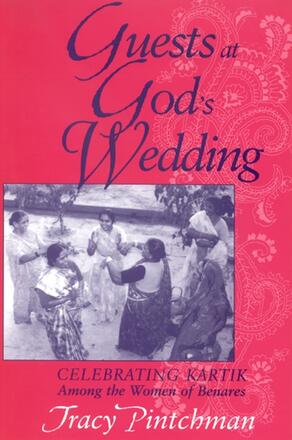
Guests at God's Wedding
Celebrating Kartik among the Women of Benares
Alternative formats available from:
A fascinating look at women’s rituals honoring the god Krishna.
Description
This fascinating look at the sacred Hindu month of Kartik (October–November) as it is celebrated in the city of Benares in North India highlights Kartik-related practices, stories, songs, and experiences particular to women. During Kartik, Hindu women living in and around Benares meet daily to enact a form of ritual worship, or puja, in which they raise the playful Hindu deity Krishna from childhood to adulthood throughout the month, ultimately marrying him to the plant-goddess Tulsi (Basil). Tracy Pintchman explores how women who perform Kartik puja understand and celebrate both Kartik and Krishna in ways that are linked to the desires, hopes, fears, and social realities characteristic of many Hindu women living in the rather conservative social milieu of this region.
Tracy Pintchman is Professor of Hindu Studies at Loyola University Chicago. She is the author of The Rise of the Goddess in the Hindu Tradition and the editor of Seeking Mahadevi: Constructing the Identities of the Hindu Great Goddess, both also published by SUNY Press.
Reviews
"There is a lamentable dearth of material on urban religious experiences in South Asia, which makes this book particularly welcome. The author is a gifted translator; her renditions of the stories and songs of women’s Kartik rituals are a pleasure to read and are among the book's most attractive and important contributions. She is also well versed in Sanskrit literatures, which allows her to consider popular traditions and their mythological elements thoroughly and precisely as they may emerge and diverge from Puranic sources. Eminently accessible, the book would be useful at both the undergraduate and graduate levels. ” — Ann Grodzins Gold, coauthor of In the Time of Trees and Sorrows: Nature, Power, and Memory in Rajasthan
"An excellent resource for South Asian specialists in religion and folklore, Guests at God's Wedding presents a vivid picture of all that is entailed in the sacred month of Kartik. " — Kirin Narayan, author of Storytellers, Saints, and Scoundrels: Folk Narrative in Hindu Religious Teaching
"A powerful feature of the book is its combination of textually based and field-based research. Pintchman provides a view of how the religious world of these women participants looks from the inside—with admirable attention, simultaneously, to the issues raised by their construction of reality. The book would make an excellent ancillary text in courses dealing with women's religion globally, Hinduism broadly, and postcolonial challenges to Western feminism. " — John Stratton Hawley, coeditor of Devi: Goddesses of India